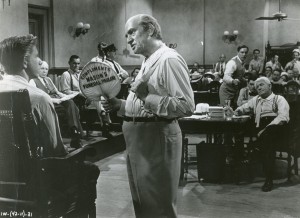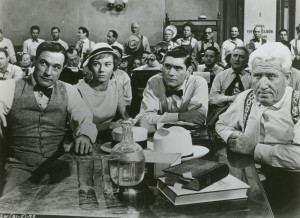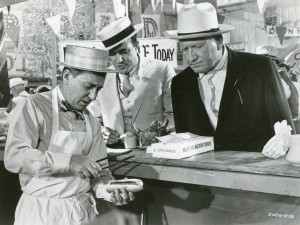by Barb Lentz.
The five movies Bob provided for me from which to choose were these:
Anatomy of a Murder (1959)
Bullets or Ballots (1936)
Inherit the Wind (1960)
Mildred Pierce (1945)
Too Many Husbands (1940)
I chose Inherit the Wind from this list. I have heard the title over the years, but had never seen the movie. As I read the description of the movies, Inherit the Wind seemed the most interesting to me. I have seen other movies with Spencer Tracy, and even one where he also portrays a lawyer (Adam’s Rib).

The movie starts with a group of four men assembling, and then marching toward a school. They arrive in a classroom where Bert Cates (Dick York) is teaching about the theory of evolution. He is arrested for disobeying a civil law, by publicly contradicting the story of creation from the Bible. We learn that the townspeople are fundamentalist Christians who do not want anything introduced or taught to their children that might deviate from the path of the Lord. A famous lawyer, Matthew Harrison Brady (Fredric March), decides to represent the prosecution in the case. Brady is a former presidential candidate and a well-known and vocal fundamentalist Christian. He is welcomed with a parade and is even given an honorary position in the military of Hillsboro.
You just wonder what will happen to poor Bert Cates, having to face the wrath of this famous attorney, whom the townspeople adore. Then a reporter from the Baltimore Sun, E. K. Hornbeck (Gene Kelly, cast against type) visits Bert in jail and informs him that another famous lawyer, Henry Drummond (Spencer Tracy), has agreed to defend him in the case. When Drummond arrives in town, the townspeople do not welcome him, and even make it clear that they are not happy that he is there. Through the story, you learn that Brady and Drummond were good friends, and that over a difference of philosophy, parted ways.
The majority of the story occurs in the courtroom. The judge (Harry Morgan), is clearly subjective and gives leeway to the prosecution, but absolutely none to the defense. The prosecution opens the courtroom battle and calls many witnesses.

One evening there is a “revival” and most of the townspeople attend, including the minister’s daughter Rachel (Donna Anderson), who is also Bert’s fiancé. The oratory of Reverend Brown (Claude Akins) becomes rather heated so Brady helps soothe the crowd, quoting a scripture from the Bible from which the title of the film derives, and which emphasizes forgiveness. Rachel is quite upset and confides to Brady why Bert had stopped attending the Church, and also her torment over her father’s attitude regarding Bert’s right to believe as he chooses.
The next day, Brady calls Rachel to the stand and makes her tell the court what she disclosed to him in confidence. This is damning testimony to Bert. When the defense starts its case, Drummond calls experts in the sciences, but is denied permission for any of them to take the stand. As each of his methods to defend his client is met with the court’s refusal to listen, Drummond becomes quite passionate, and is held in contempt of court.
Drummond admits to Hornbeck that he needs a miracle, which gives him an idea. The next day, Drummond apologizes to the judge and calls Brady to the stand as an expert on the Bible. The judge objects, but Brady is happy to defend religion on the stand. After a few preliminaries, Drummond notes what seem like inconsistencies in the scripture and coaxes Brady to pontificate his own interpretation. Drummond doesn’t disprove the Bible, but he does make Brady sound like a pompous prophet, which weakens the prosecution’s case. The defense rests and the jury deliberates. A radio broadcasts the verdict across the country: Bert Cates is found guilty. After a quick word from the mayor the judge sets the punishment as a fine of $100. Brady has remarks prepared, but no one wants to listen, and his life and career end very abruptly as the courthouse is emptying.

My top five moments of the movie are:
1. When we see the four men meet and advance through the empty town in the beginning scene beneath the opening credits. You wonder just what they are going to do.
2. When Hornbeck, the Baltimore reporter, informs Bert that the paper will arrange and pay for his defense attorney. This follows the announcement that Matthew Brady was going to be the prosecuting attorney.
3. When the townspeople, lawyers and reporter attend Reverend Brown’s outdoor sermon after the day in the sweltering courtroom. Brown gets a little out of control, even damning his own daughter, Rachel, and Brady calms everyone by quoting the Bible verse that includes “Inherit the wind” and asking for a tone of forgiveness.
4. When Brady and Drummond are in rocking chairs on the front porch of the boarding house where they are both staying. Drummond recounts the story of a special toy, Golden Dancer, from his childhood. This is to illustrate that things may look a certain way, but are not always what they seem.
5. When Drummond is resting and Hornbeck tells him that there is no chance he will win the case. You can see Tracy’s eyes light up when Hornbeck tosses him a Bible and tells him to look for a miracle in there; that’s when he gets the idea to question Brady as a Biblical authority.
Is Inherit the Wind a classic? Yes. It is engaging, has great character development and acting, and is a significant film. Even though I didn’t like the Brady character I had to respect the way he never stooped to the level of bigotry and hatred that the townspeople often showed. He took pains to keep the prayer revival from getting out of control. But he shouldn’t have used Rachel’s confidential story against Bert, and putting her on the stand was wrong. I also really liked Gene Kelly as the cynical reporter; I thought Kelly fit the role to a tee. The film stirs emotions, no matter what one thinks about science and religion, and I believe that no one who sees it will be left without a strong reaction to its story.
BRL 31 March 2014.
Inherit the Wind (November, 1960) (Stanley Kramer Productions / United Artists)
Produced and Directed by Stanley Kramer.
Screenplay by Nedrick Young and Harold Jacob Smith.
Based upon the play by Jerome Lawrence and Robert E. Lee
Principal Cast (character, performer):
Henry Drummond Spencer Tracy
Matthew Harrison Brady Fredric March
E. K. Hornbeck Gene Kelly
Bertram “Bert” Cates Dick York
Rachel Brown Donna Anderson
Judge Mel Coffey Harry Morgan
Reverend Jeremiah Brown Claude Akins
Prosecutor Tom Davenport Elliott Reid
Sarah Brady Florence Eldridge
128 minutes. B&W. Widescreen (1.66:1). Not Rated.
